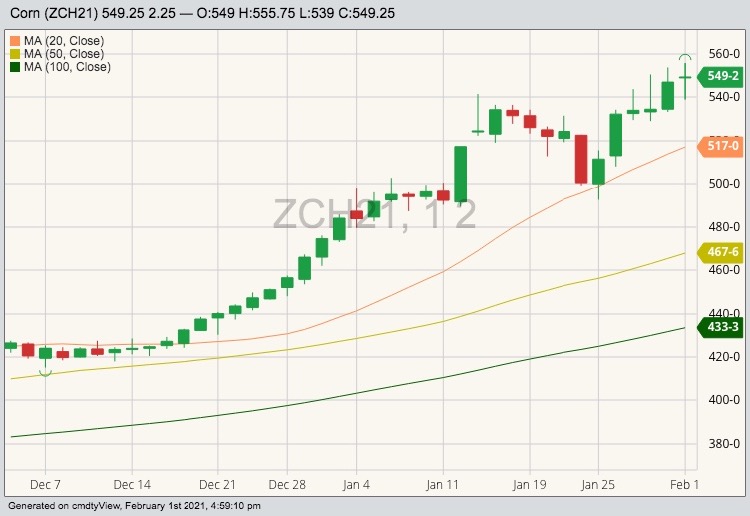Chicago | Reuters — U.S. corn futures climbed to 7-1/2-year highs on Monday, supported by continued export demand.
Soybeans ended slightly weaker after climbing back from a 20-cent drop in earlier trading, supported by a slow Brazilian harvest that could affect exports (all figures US$). Wheat followed soy lower.
The Chicago Board of Trade’s most-active March corn ended 2-1/4 cents higher at $5.49-1/4 per bushel, after touching $5.55-3/4, its highest since June 2013.
March soybeans fell 4-3/4 cents, to $13.65-1/4 per bushel, while March wheat dropped 12 cents, to $6.51.
Read Also

‘Significant’ Canadian GDP slide expected in 2026, FCC says
Farm Credit Canada expects continued trade woes and mortgage renewals to weigh on Canada’s economic growth in 2026
The U.S. Agriculture Department confirmed private export sales of 125,730 tonnes of U.S. corn to Mexico and another 110,000 tonnes to Japan on Monday morning, for delivery in the 2020-21 marketing year.
That was on top of corn sales last week to China totaling 3.74 million tonnes, one of the largest U.S. corn export sales weeks on record.
“We have the fundamental reasons to think things will continue higher,” said Dan Hussey, senior market strategist at Zaner Group.
Soybeans pared losses in late trading, but couldn’t move into positive territory despite harvest delays and potential crop damage from unwelcome rain in Brazil that could slow the influx of new supplies into the world market.
“The Brazil soybean shipment schedule for February is huge,” said Terry Roggensack, agriculture research specialist at Hightower Report. “Anything goes wrong and we’ve got a problem for beans.”
Wheat followed soybeans lower, though it was supported by the news that the Russian government is considering an additional tax on the wheat it ships abroad, beginning June 1.
“We’ve got this man-made supply disruption in Russia,” said Joe Vaclavik, president of brokerage and consulting firm Standard Grain. “That could steer some additional wheat business to the U.S., but it’s also a deal that could be ended with a stroke of a pen.”
Egypt issued a tender to buy an unspecified amount of wheat from global suppliers for shipment March 15-30.
— Christopher Walljasper reports on agriculture and ag commodities for Reuters from Chicago.

















